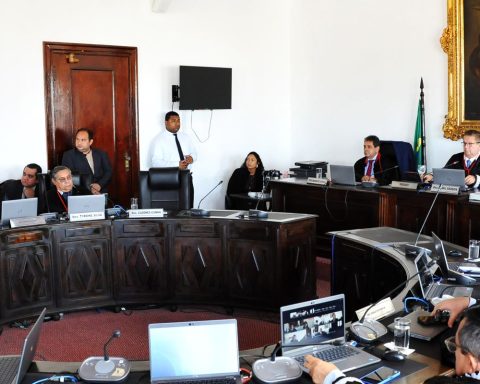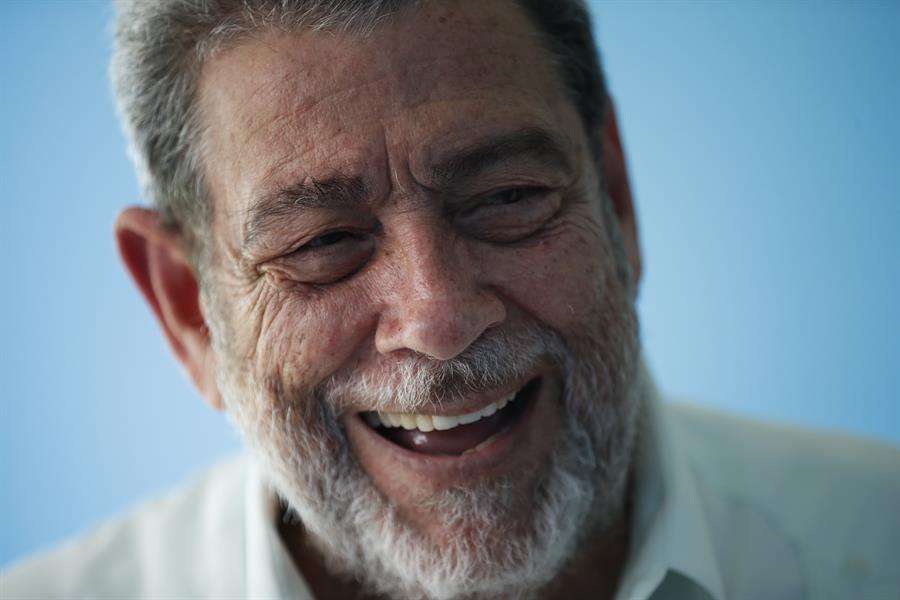The Minister of Mines and Energy, Alexandre Silveira, said on Monday (23) that Brazil is in the “almost final” phase of obtaining a license for oil exploration on the equatorial margin. Located on the country’s northern coast, the area is considered a new pre-salt layer due to its potential for oil reserves.
“The government wants to strictly comply with all environmental legislation and is almost in the final stages of moving forward with the possibility of first diagnosing our wealth on the equatorial margin, and then, sovereignly, deciding on this exploration,” he told journalists in Rio de Janeiro.
Silveira made the statement shortly after participating in the opening of ROG.e 2024, formerly known as Rio Oil & Gas. The event is one of the largest in the oil and gas industry in the world and brings together representatives of national and international companies and authorities.
According to the minister, Brazil is the “world’s breadbasket of clean and renewable energy” and cannot give up oil exploration and production.
“Brazil is the great global green power, we have the authority to say that our matrix is plural and we cannot give up this plurality,” he declared.
THE equatorial margin covers an area which runs from the coast of Rio Grande do Norte to that of Amapá. The potential exploration of oil in the region, which includes the mouth of the Amazon River, is criticized by environmentalists, concerned about possible environmental damage.
Petrobras is seeking a license from the Brazilian Institute of the Environment and Renewable Natural Resources (Ibama), linked to the Ministry of the Environment and Climate Change, to begin exploration work on the coast, which includes the Foz do Amazonas Basin.
Environment
The minister assured that Petrobras has been complying with environmental conditions. “As Petrobras has been complying, we have been increasingly supporting this licensing.” He did not set a deadline for the state-owned company to obtain authorization from Ibama.
Silveira emphasized that Petrobras is a world reference company in oil exploration offshore (at sea) and said that he met, last week, with representatives of the Indian government interested in a partnership with the Brazilian state-owned company to search for oil in deep and ultra-deep waters in the Indian Ocean.
“A huge nation like India would not trust just anyone. They are growing rapidly and need the best experts.”
Alexandre Silveira argued that, as long as there is demand for oil in the world, Brazil should position itself as a global producer. The country is currently the largest producer in South America and the ninth largest in the world.
“We will not stop being exporters to become importers, that would not be fair to Brazilians,” he said.
“President Lula will not give up on taking advantage of all of Brazil’s potential to deliver the legacy of a more inclusive country, and our energy plurality is our greatest strength,” he added.
The minister cited clean energy sources such as hydroelectricity, solar, wind, biomass and biofuels to show that Brazil is on the path to energy transition towards an economy with low use of polluting fuels.
Daylight Saving Time
Alexandre Silveira took advantage of the conversations with journalists to reinforce that Brazil does not face the risk of energy insecurity and that a possible return to daylight saving time will be treated by the government with “tranquility” and taking into account the effect on the daily lives of Brazilians.
According to him, advancing the clocks would be a tool to seek to improve the price of energy to the consumer. Last Thursday (19), the National Electric System Operator (ONS) recommended to the government the return of the adoption of daylight saving time.
Incentive program
During the opening of ROG.e, the minister signed the ordinance that creates the Potencializa E&P program. The initiative aims to encourage the sustainable development of oil and gas exploration and production, with a focus on new exploratory frontiers and fields of marginal economic viability (with less commercial interest).
Potencializa E&P will have the participation of the Ministry of Mines and Energy (MME), the National Agency of Petroleum, Natural Gas and Biofuels (ANP), the Energy Research Company (EPE) and the Geological Service of Brazil (SGB-CPRM), in addition to other invited institutions, which will not have the right to vote.
The creation of the program provides figures for the government’s interest in the equatorial margin. According to the MME, the expectation is that R$280 billion will be invested in the area with potential reserves of 10 billion barrels of oil and the potential to generate 350,000 jobs.
Energy transition
ROG.e brings together until Thursday (26), at Boulevard Olímpico, in the port area of Rio de Janeiro, names from the global oil industry, including producers and suppliers.
In the corporate environment dedicated to the exploration of fossil fuels, the participants at the opening table argued that there is no inconsistency between encouraging the activity and, at the same time, seeking paths towards the energy transition.
Petrobras president Magda Chambriard explained that the state-owned company’s interest in the equatorial margin is part of the energy security process, “in a safe and environmentally responsible manner”.
She stressed that Brazil has around 50% of its energy matrix from renewable sources, a figure higher than the world average of 16%. “Brazil expects to reach 64% by 2050,” she said.
She mentioned that, in addition to producing greener fuels, such as biodiesel, Petrobras collaborates with the energy transition through cleaner production techniques.
According to Chambriard, the Brazilian pre-salt layer emits carbon dioxide emissions that are half the global level. “We will continue to explore and produce oil and reduce our carbon footprint,” he said.
ANP’s CEO, Rodolfo Saboia, explained that the energy transition will not be for economic or efficiency reasons, that is, it is not motivated by lower costs or more powerful fuels. Therefore, according to him, it is a process that “will cost a lot”.
He classified Brazil as a powerhousewhich can be understood as a global reference. “We have the potential to develop all forms of energy, renewable and non-renewable, and help the world in the energy transition scenario.”
The secretary-general of the Organization of the Petroleum Exporting Countries (OPEC), Kuwaiti Haitham Al Ghais, said that the countries of the organization are looking for ways to produce oil more efficiently and capture carbon from the atmosphere. OPEC brings together large oil producers, mainly in the Middle East.
Haitham Al Ghais acknowledged the leading role played by Brazil – a country that is not a member of OPEC – in the energy transition. “Brazil has shown that it is possible to be a leader in renewable energy and produce the oil and gas that the world will need.”
Protest
Outside the meeting, environmental activists organized a silent demonstration. They displayed an inflatable with posters of executives from major oil companies and the slogan “They profit, we suffer.”
According to Tica Minami, one of the protest organizers, the event is a contradiction in the quest for energy transition. She cites episodes of climate emergency, such as the country’s historic drought, frequent heat waves and forest fires to justify her opinion.
“Rio de Janeiro is hosting this event that tries to appear innovative, also concerned with climate change, but in reality it is an event to promote fossil fuels, which are the main cause of the climate emergency we are experiencing today,” he told Brazil Agency.
“This is not an energy transition, for us this is energy regression,” added the activist, who sees it as a contradiction that the Brazilian government positions itself as a global climate leader and defends oil exploration in the Amazon.
*With the collaboration of Francielly Barbosa


















